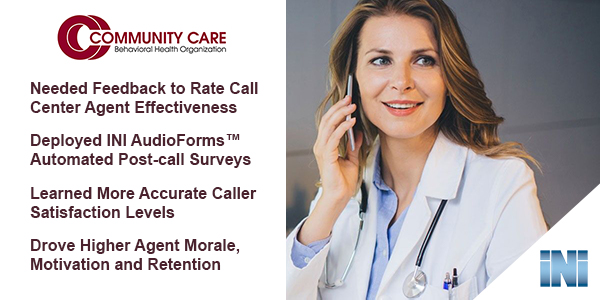

Community Care Behavioral Health Organization, a non-profit managed care organization for mental health and substance use disorders, provides services for medical assistance members in more than half of the counties in Pennsylvania. Their customer service call center is a 47-agent, 72-line, 24/7 operation that handles an average of 27,000 monthly calls from Community Care members and families. In addition, because the call center is open 24 hours, it fields after-hours support calls for other health system and cooperate lines of business.
According to Virginia Bernaciak, director of member services at Community Care Behavioral Health, call center agents must be top performers because the incoming calls they receive are not of the yes/no variety. Calls often involve people who are in a delicate state due to the sensitive nature of Community Care’s line of business. It’s not uncommon for an agent to take a call from an individual who is in a mental health or substance use disorder crisis situation. “It’s very important that our calls are handled correctly and efficiently, and that our callers know that we are here to assist them at any given time,” said Bernaciak. To ensure agents are continually performing at the highest level, they needed a way to gather caller feedback about their experience working with the call center. The call center could then leverage the feedback data to guide and motivate agents, and reward excellence.
Additionally, every April, Community Care Behavioral Health conducts a survey of its more than one million members. Three of the questions on the annual survey deal with customer service and, unfortunately, in multiple years’ results, customer service scored low. Call center management knew the center’s agents were working hard and providing superior customer service, but survey answers weren’t reflecting that effort. To provide backing data confirming what they already knew to be true, the call center needed to find a way to more accurately show the level of service callers receive from Community Care call center agents.
Community Care’s call center management consulted with ConvergeOne and Interactive Northwest, Inc. about options to address their challenges, and they collectively agreed that deploying INI’s post-call survey product, INI AudioForms™ (now INI FormStudio™), would provide the center with the actionable feedback data they needed.
The process Community Care deployed for surveying is relatively simple. In addition to playing a message at the beginning of the call informing callers of the post-call survey, the agent invites the caller to participate in the survey personally. The invitation reinforces to the caller that he or she will be rating the customer service of the current transaction specifically, and not Community Care’s service overall. The distinction helps ensure the accuracy of the data collected. Upon completion of the call, the caller is immediately connected to the survey, so he or she can answer while the experience is fresh in his or her mind.
The application’s user-friendly interface ensures that the call center can make necessary survey changes in a timely fashion and maintain flexibility for ever-changing caller needs. According to Bernaciak, call center management is comfortable creating and modifying surveys on their own, with Virginia calling it “very easy” to do. Thanks to the simplicity and effectiveness of the initial survey, Community Care is exploring options to introduce additional surveys that will further break down its customer service effectiveness, and may introduce a survey specific to other business units’ after-hours calls.
“INI and ConvergeOne share the same approach to the customer that we do: covering everything from A to Z, in that order. The deployment was easy. Effortless. We wouldn’t want to work with anyone else; we loved the experience. Even when creating the survey, INI brought a lot of ideas to the table that we hadn’t thought of yet. It was a very collaborative process.”
Virginia Bernaciak
Director, Member Services, Community Care Behavioral Health, HPCCB-Member Services
Results
The post-call satisfaction surveys have been a triumph at Community Care Behavioral Health. Nearly half of callers accept a survey, giving call center managers a solid sample size with which to accurately gauge performance levels. Interestingly, within the first few months after deploying the application, they had offered surveys to 25,000 calls, and management had the real-time data they needed to prove that the low customer service scores on the annual all-member survey did not accurately represent the call center’s service levels. In fact, the center was averaging a satisfaction score of 99.8 percent.
Bernaciak says real-time feedback has helped with agent morale and motivation. Each month, agents meet with their supervisors to discuss the surveys specific to their calls and make any necessary adjustments. During those meetings, agents get to listen to the open-ended “any additional comments” recordings. Bernaciak said, “Sometimes you don’t realize how good you are. Having someone say it—and hearing it—helps the customer service representative understand the impact they have with our members.”
Creating a good survey was also important to Community Care Behavioral Health to enhance its overall customer experience. They took time to get the questions just right so that they could gather the information they needed to truly make a difference. Not only did they need feedback for agent evaluation, but it was important that the questions were worded so that the feedback was actionable. “Members have to see us taking action based on their surveys, so they feel like their voice is truly being heard,” said Bernaciak. “We’re open to changing the questions if we need to, but we’ve never had to; they’ve been very effective and really get to the heart of what we’re trying to learn from our callers.”
